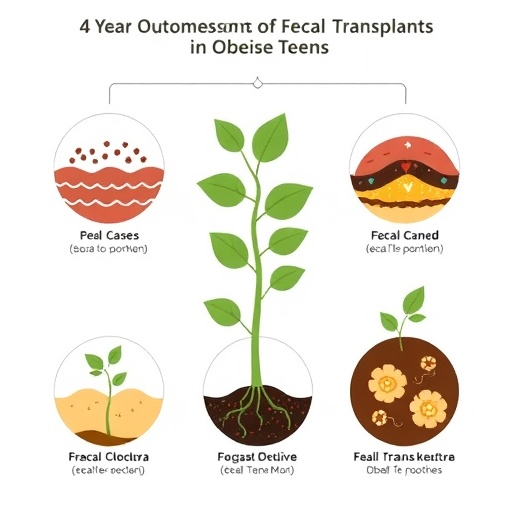
In a groundbreaking study that could reshape the future of obesity treatment, researchers have unveiled the long-term health impacts of fecal microbiota transplantation (FMT) in adolescents living with obesity. As the global obesity epidemic continues to burgeon, particularly among younger populations, new therapeutic strategies are urgently needed to combat the multifaceted health burdens associated with excess weight. This landmark investigation, published in Nature Communications, offers an unprecedented four-year follow-up evaluation of adolescents who underwent FMT, a procedure designed to alter the gut microbiome by transferring intestinal bacteria from healthy donors to recipients. The findings not only shed light on the durability of microbiome-based interventions but also highlight previously uncharted avenues for managing metabolic health in obese youth.
Obesity in adolescence presents a complex clinical challenge, with profound metabolic, cardiovascular, and psychosocial ramifications. Traditional interventions focusing on lifestyle modification and pharmacotherapy have exhibited limited long-term efficacy, prompting exploration into alternative approaches that target the gut microbiota—a critical regulator of host metabolism and immune function. FMT operates by restoring microbial diversity and function, potentially correcting dysbiosis-associated metabolic disturbances. However, despite a growing body of short-term data suggesting improvements in insulin sensitivity, inflammation, and weight control, there has been a conspicuous lack of evidence on the sustainability of these effects beyond initial treatment phases.
This novel study bridges this significant knowledge gap by meticulously tracking a cohort of adolescents who received FMT for obesity management. Utilizing rigorous clinical assessments, metabolic profiling, and microbiome sequencing techniques over a period extending to four years post-intervention, investigators aimed to delineate the trajectory of health outcomes influenced by gut microbial modulation. The persistence or attenuation of therapeutic benefits was carefully monitored, providing crucial insights into whether a single or limited course of FMT can engender lasting physiological changes in a pediatric population struggling with early-onset obesity.
The methodology involved enrolling adolescents with moderate to severe obesity, excluding those with confounding medical conditions, to isolate the effects of FMT. Donors were screened extensively to ensure microbiome viability and safety, consistent with evolving best practices in transplantation protocols. The transplanted microbial communities were characterized before administration to confirm diversity and richness, parameters shown to correlate with metabolic health. Recipients underwent FMT via colonoscopic infusion, a technique employed to enhance engraftment efficiency and colonization success within the lower gastrointestinal tract.
Data analysis revealed compelling trends: subjects exhibited significant improvements in insulin resistance markers within the first year post-FMT, aligning with previous short-term observations. More notably, a proportion of these metabolic gains were sustained at the four-year mark, suggesting a durable recalibration of host-microbiota interactions. Such enduring benefits challenge prior assumptions that repeated or maintenance treatments might be necessary to preserve clinical outcomes. Additionally, subtle yet meaningful weight stabilization was noted, an encouraging sign given the propensity for weight regain in adolescent obesity interventions.
Gene expression analyses obtained from peripheral blood samples further corroborated these results, indicating a systemic anti-inflammatory effect sustained over years following FMT. Chronic inflammation, a hallmark of obesity-related complications, is increasingly recognized as a therapeutic target; thus, these findings imply that microbiome manipulation may exert far-reaching effects beyond the gut. Furthermore, gut microbial composition data demonstrated sustained presence and activity of key bacterial taxa associated with metabolic health, providing molecular underpinnings for the clinical observations.
The study also ventured into assessing the psychological and quality-of-life dimensions post-treatment, finding moderate improvements in mood and self-esteem metrics. Given the psychosocial toll of adolescent obesity, these outcomes advocate for holistic considerations in evaluating novel therapies. Importantly, the safety profile of FMT remained robust throughout the extended follow-up, with no serious adverse events reported, underscoring the procedure’s potential as a feasible intervention in this vulnerable population.
One of the most exciting implications of this research lies in its potential to pivot obesity treatment paradigms toward microbiome-focused strategies. While pharmacological and behavioral interventions remain central, harnessing the gut microbiota’s influence represents a novel frontier with the capacity to unlock individualized therapies. This study’s demonstration of long-term benefits foreshadows the development of precision medicine approaches that could optimize donor selection, transplantation techniques, and complementary lifestyle modifications.
Critically, the authors acknowledge certain limitations—primarily the cohort size and the need for replication in diverse populations to generalize findings broadly. Additionally, the interplay between genetics, diet, and environment with FMT outcomes remains a fertile ground for future investigation. Such complexities necessitate longitudinal, multidisciplinary studies integrating metagenomics, metabolomics, and clinical health assessments to deepen understanding and refine interventions.
Emerging from this research is a paradigm-shifting perspective that frames the gut microbiome not merely as a supplementary target but as a central player in obesity pathophysiology. It invites clinicians and researchers alike to rethink the biological undercurrents of metabolic disease and consider therapies that transcend traditional boundaries. As adolescence is a critical window for establishing lifelong health trajectories, the prospect of durable microbiome-centric health benefits holds transformative promise.
The study also serves as an impetus to explore preventative applications of microbiota modulation. If microbiome composition and function can be favorably influenced prior to the onset of obesity or metabolic derangements, there may be opportunities to attenuate disease incidence at the population level. Public health strategies integrating dietary, microbial, and behavioral elements might emerge from the foundational work exemplified here.
In sum, this rigorous investigation into FMT’s long-term efficacy in adolescent obesity not only validates the microbiota as a potent therapeutic axis but also illuminates pathways to sustainable health improvements in a notoriously treatment-resistant demographic. It catalyzes a shift toward integrative medicine that leverages microbial ecology for metabolic resilience, marking a decisive step forward in the battle against obesity’s global health burden.
The convergence of molecular insights, clinical outcomes, and microbiome science heralds a new chapter where gut microbes become allies rather than bystanders in disease management. As the scientific community digests these findings, the momentum toward clinical translation and optimization is likely to accelerate, potentially revolutionizing how we conceive and combat obesity from adolescence through adulthood.
Future directions will undoubtedly explore combinatorial approaches that amplify FMT effects, such as synbiotics, diet personalization, and novel microbial consortia engineering. The intricate symbiosis between host and microbiome represents a vast, largely untapped reservoir for innovation—a treasure trove poised to redefine metabolic health paradigms in years to come.
Subject of Research: Long-term health effects of fecal microbiota transplantation in adolescents with obesity.
Article Title: Long-term health outcomes in adolescents with obesity treated with faecal microbiota transplantation: 4-year follow-up.
Article References:
Wilson, B.C., Zuppi, M., Derraik, J.G.B. et al. Long-term health outcomes in adolescents with obesity treated with faecal microbiota transplantation: 4-year follow-up. Nat Commun 16, 7786 (2025). https://doi.org/10.1038/s41467-025-62752-4
Image Credits: AI Generated
Tags: adolescent obesity and health interventionschallenges of obesity in adolescencefecal microbiota transplantation in adolescentsfour-year follow-up fecal transplant studygut microbiome and metabolic healthimpacts of fecal transplants on obesityinnovative treatments for childhood obesitylong-term outcomes of fecal transplantsmetabolic health in obese youthmicrobial diversity and weight managementobesity treatment strategies for teensrestoring gut health in teenagers




